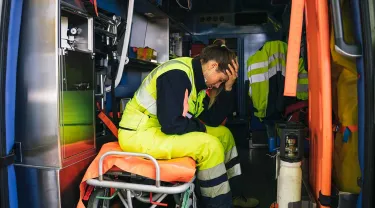Firefighters and other first responders cope with constant workplace stress and must repeatedly perform under pressure. How they do so—and what effects stress has on their job performance and mental health—are questions that drive Ayanna Thomas’ research.
A professor in Tufts’ Department of Psychology and the dean of research for the School of Arts and Sciences, Thomas is particularly interested in how acute stress responses hinder memory retrieval. Examples include when individuals freeze during a high-stakes exam or in an emergency, and then struggle to access information they need in order to perform.
Thomas examines whether information may be learned in a way that allows access even in high-stress situations; in other words, she looks for ways to create stress-resistant memories. In terms of brain chemistry, she’s studying whether or not we can develop different kinds of retrieval pathways to access information, circumventing what happens when cortisol (the body’s main stress hormone) is blocking access to memory.
For answers, Thomas is collaborating with Holly Taylor in Tufts’ Department of Psychology and Eric Miller at the School of Engineering, along with researchers at Massachusetts General Hospital (MGH) and on-the-ground emergency response personnel in Florida’s Pinellas County Fire Department.
So far, investigations have shown that employing rigorous, retrieval-based learning strategies can establish multiple retrieval pathways, enabling individuals to perform well even when under stress. Building upon these findings, the researchers are conducting a comprehensive study to understand the underlying mechanisms behind performance breakdowns under stress. By examining cognitive functioning and mental health in first responders, they aim to identify critical points where stress impairs performance and develop targeted interventions.
In the laboratory, researchers are inducing acute stress in study participants to observe the immediate effects on cognitive performance. In the field, they are comparing newly trained responders to seasoned veterans to understand how experience shapes coping mechanisms and performance. In partnership with experts in trauma and stress at MGH, they are exploring effective support strategies for those individuals dealing with high-pressure situations.
“We hope to not only develop effective training protocols that allow people to continue to access information even in high-stakes, stressful circumstances,” Thomas said, “but also to identify factors that might negatively impact performance and develop methods for examining them on a case-by-case basis so that interventions can be employed when needed.”
